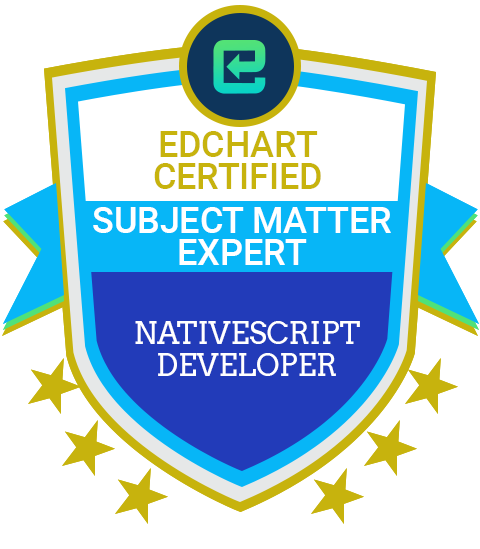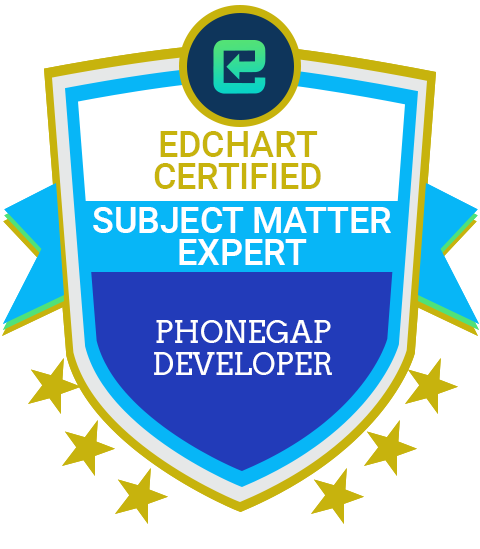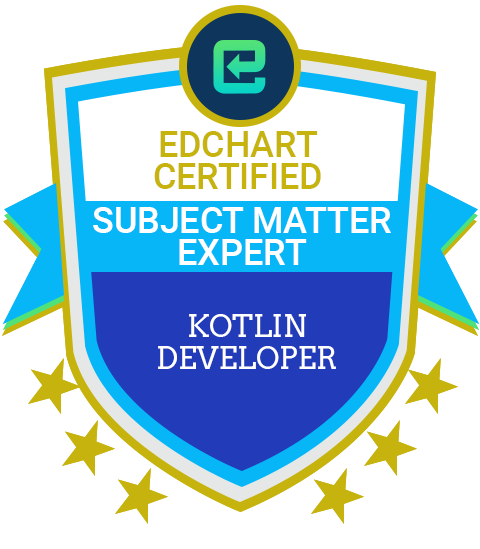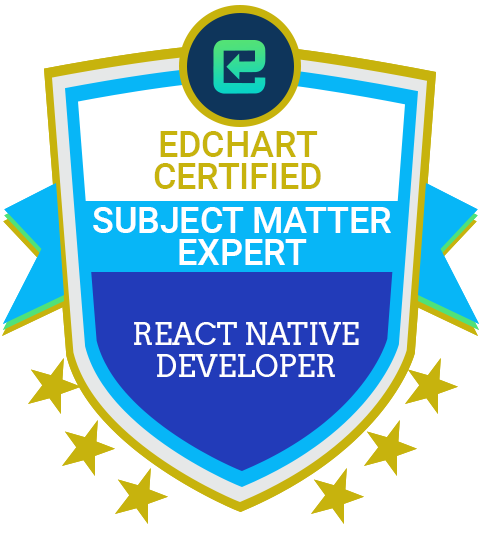
Edchart Certified
Flutter Developer SME
The Flutter Developer page is a comprehensive destination for developers eager to craft beautiful and performant native applications for mobile, web, and desktop platforms using the Flutter framework. Flutter offers a streamlined development experience with its single codebase approach, allowing developers to write code once and deploy it across multiple platforms, saving time and effort. The Developer page provides a wealth of resources, including extensive documentation, tutorials, and samples, designed to support developers at every stage of their journey. Whether you're a novice getting started with Flutter's widget-based UI framework or an experienced developer seeking advanced techniques like state management and animations, the Developer page offers detailed guidance and best practices.
flutter developer | flutter certification | flutter | flutter mobile app | flutter dev | flutter app developer | flutter flow | flutter app | flutter web | flutterflow developers | flutter firebase | google flutter | firebase flutter | flutterflow developer | find flutter developers | flutter crashlytics | flutter programming | crashlytics flutter | revenuecat flutter | flutter online | onesignal flutter | flutter software | flutter mobile | figma to flutter | firebase crashlytics flutter | appsflyer flutter | udemy flutter | flutter 3 | flutter widgets | flutter android | flutter experts | flutter for web | flutterdev | flutter application | learning flutter | flutter coding | flutter android studio | dev flutter | flutter learning | flutter app dev | flutter website | best flutter course | one signal flutter | android studio flutter | flutter platform | flutter for beginners | flutter designer | instabug flutter | flutter cross platform | flutter docs | developer flutter | flutter programmer | flutter firebase crashlytics | android flutter | flutter flow developer | razorpay flutter | flutter 3.0 | cloud_firestore | flutter mobile developer | flutter webrtc | flutter windows | flutter examples | fiverr flutter developer | flutter js | aws flutter | flutter and firebase | webrtc flutter | flutter pricing | app flutter | flutter by google | flutter mongodb | amplify flutter | flutter python | flutter certified application developer | firebase flutter dev | flutter onesignal | dart developer | twilio flutter | full stack flutter developer | flutter software engineer | flutter aws | mobile flutter | mongodb flutter | auth0 flutter | flutter company | flutter certification google | get flutter sdk | installing flutter | firebase messaging flutter | flutter ios app | flutter web developer | flutter front end | best flutter developers | google flutter certification | flutter course with certification | flutter mac | flutter front end developer | firebase cloud messaging flutter | get flutter | figma flutter | flutter with firebase | flutter machine learning | firebase with flutter | flutter react native | flutter mobile dev |
| India: |
|
|---|---|
|
Other Countries: |
|
Flutter Developer Certification: Your Fast Track to Global Recognition
The Flutter Developer Certification is the ultimate solution for professionals seeking to validate their Flutter expertise without undergoing traditional coursework. This certification provides instant recognition, allowing developers to prove their proficiency by passing a single exam. With the backing of Credly for global credentials, it is a globally recognized credential that employers trust.
Why Choose Flutter Developer Certification?
Earning the Flutter Developer Certification is an excellent way to gain credibility in the competitive job market. Unlike conventional certification programs that require months of study, this exam-based certification instantly validates your skills, saving time and effort. Whether you are an aspiring developer or an experienced professional, this certification enhances your career prospects and increases your visibility to recruiters.
Key Benefits:
-
Instant Certification: No need for classes or modules; just take the exam and get certified.
-
Industry Recognition: A certification that stands out among employers.
-
Credly Accreditation: Globally recognized validation of your expertise.
-
Cost-Effective: No additional training expenses; pay for the exam and get certified immediately.
Scope of Flutter Developer Certification
Flutter has revolutionized cross-platform development, making it a sought-after skill in various industries. By obtaining the Flutter Developer Certification, professionals can explore opportunities in:
-
Mobile App Development: Flutter is widely used for building high-performance iOS and Android applications.
-
Web & Desktop Applications: Companies use Flutter to create seamless web and desktop applications.
-
Freelancing & Startups: With Flutter’s efficiency, freelance developers and startups leverage it to build cost-effective apps.
-
Enterprise Software Development: Large organizations integrate Flutter for its versatility and robust ecosystem.
Additionally, being Credly certified ensures that your certification is globally verifiable and trusted by employers worldwide.
Advantages of Obtaining the Certification
The Flutter Developer Certification is designed for professionals who wish to validate their expertise without formal training. It allows individuals to earn a globally recognized credential without investing in time-consuming courses.
Key Advantages:
-
No Pre-requisites: Anyone proficient in Flutter can take the test.
-
Quick & Efficient: Get certified in a matter of hours, not months.
-
Employability Boost: Employers value Credly-backed credentials as proof of skill.
Features of the Certification
The Flutter Developer Certification offers a streamlined approach for professionals seeking to validate their expertise without lengthy training sessions.
Features:
-
Single-Test Certification: Pass one exam to receive certification.
-
100% Online: No need to attend physical classes or workshops.
-
Globally Recognized: Accredited by Credly for worldwide acceptance.
-
Budget-Friendly: Save money by skipping unnecessary training programs.
How This Certification Stands Out
The Flutter Developer Certification distinguishes itself from other certifications by offering instant validation with minimal effort. Unlike traditional certifications that require coursework and instructor-led training, this certification focuses on testing practical knowledge and skills.
Why Should You Choose It?
-
Instant Career Growth: Get recognized by top employers without extensive training.
-
Flexible Testing: Take the exam anytime, anywhere.
-
Credly Validation: Digital verification ensures credibility and trust.
Conclusion
The Flutter Developer Certification is the perfect solution for professionals looking to advance their careers quickly. With Credly-backed global credentials, this certification provides an easy, efficient, and globally accepted way to showcase your Flutter expertise. Don't wait—take the test and earn your certification today!
| Exam Timing: | 60 (Mins) |
|---|---|
| Pass Per | 60% |
| Level | Expert |
| Roles | Hybrid Mobile App Developer |
| No. of Questions | 30 |
-
Oleg Romanov (Great Britain)Attended on - 2024-03-28 15:51:20
-
Keenan Harrison (United States of America(USA))Attended on - 2024-04-15 20:39:13
-
Mevlüt İNAN (Turkey)Attended on - 2024-05-06 18:45:16
-
Amir Abasi (Iran)Attended on - 2024-05-14 09:35:13
-
Biliy Oleksandr (Ukraine)Attended on - 2024-05-16 14:22:11
-
Seth Cornelio (Philippines)Attended on - 2024-05-21 15:24:25
-
Oleg Lavrentyev (Ukraine)Attended on - 2024-05-24 07:34:50
-
Hordii Kovalenko (Ukraine)Attended on - 2024-05-29 14:30:42
-
Maksym Levytskyi (Ukraine)Attended on - 2024-06-04 07:10:31
-
Oleksandr Zavialov (Ukraine)Attended on - 2024-06-04 07:23:43
-
Pavlo Demydenko (United States of America(USA))Attended on - 2024-06-08 10:24:34
-
DASARI PAVAN SAI KUMAR (India)Attended on - 2024-06-12 16:08:36
-
KOPPADI VIJAYA RAMAKRISHNA (India)Attended on - 2024-06-12 16:14:11
-
Hoang Trung Quan (Vietnam)Attended on - 2024-06-13 01:42:31
-
PREETI SANGER (India)Attended on - 2024-06-25 17:50:35
-
Illia Fedenko (Ukraine)Attended on - 2024-07-01 02:28:35
-
Kinjal (India)Attended on - 2024-07-02 12:00:04
-
Spencer Jacobs (United States of America(USA))Attended on - 2024-07-30 00:59:47
-
Volodymyr Vakh (United States of America(USA))Attended on - 2024-08-15 12:35:33
-
Linesh Bhanushali (India)Attended on - 2024-08-18 13:27:11
-
Hunter Sullivan (United States of America(USA))Attended on - 2024-08-21 21:32:07
-
Ditmar Jubica (Albania)Attended on - 2024-08-23 15:35:40
-
Rajalingam (India)Attended on - 2024-08-28 12:20:44
-
Jana Hisham (Egypt)Attended on - 2024-09-05 14:35:38
-
Maksym (Ukraine)Attended on - 2024-09-10 12:03:37
-
Valerii Kostynskyi (Ukraine)Attended on - 2024-09-10 14:18:23
-
Dmytro Kalashnyk (United States of America(USA))Attended on - 2024-09-11 06:37:15
-
Muhammed Sadiq Afridi (Pakistan)Attended on - 2024-09-12 06:59:07
-
Neelu Yadav (India)Attended on - 2024-09-12 15:59:53
-
Mykhailo Kulyk (United States of America(USA))Attended on - 2024-09-13 05:50:46
-
Shubham Garg (India)Attended on - 2024-09-16 05:49:19
-
Vijay Baghel (India)Attended on - 2024-09-16 07:24:43
-
Subhan Ali (Pakistan)Attended on - 2024-09-16 12:46:05
-
Binit Singh (India)Attended on - 2024-09-19 07:17:04
-
Aditiya Raj (India)Attended on - 2024-09-19 08:51:18
-
Akshay Kumar Bura (India)Attended on - 2024-09-19 09:18:41
-
Binit Singh (India)Attended on - 2024-09-23 09:46:04
-
Aditiya Raj (India)Attended on - 2024-09-23 10:54:55
-
AbdulGhafoor Abaidullah (Pakistan)Attended on - 2024-09-29 09:22:05
-
Tafitasoa Josia Florencia (Madagascar)Attended on - 2024-10-02 13:17:42
-
Lakshmikant Sahoo (India)Attended on - 2024-11-01 16:21:34
-
Tim Warren (United States of America(USA))Attended on - 2024-11-22 00:13:00
-
Gert Haxhija (Albania)Attended on - 2024-12-04 06:10:06
-
Dipak Raval (India)Attended on - 2024-12-07 14:28:03
-
HIMANTHA SAHAN BANDARA (Sri Lanka)Attended on - 2024-12-11 18:30:34
-
Muhammad Abu Bakar (Pakistan)Attended on - 2025-01-04 09:20:47
-
Awds Cdsvv (India)Attended on - 2025-01-13 06:38:53
-
Wai Yan Linn (Myanmar)Attended on - 2025-01-15 15:45:43
-
Brain Binary Infotech (India)Attended on - 2025-01-25 09:15:08
-
Pawan (India)Attended on - 2025-01-26 07:54:31
-
Muhammad Abu Bakar (Pakistan)Attended on - 2025-01-29 07:30:06
-
Maqbool Tariq (Pakistan)Attended on - 2025-01-30 07:02:37
-
Top Dev (United States of America(USA))Attended on - 2025-02-04 17:53:34
-
Lê Quang Đức (Vietnam)Attended on - 2025-02-06 09:39:47
-
Nagwa Shazly (Egypt)Attended on - 2025-02-08 23:31:02
-
Roshan Chhipavadiya (India)Attended on - 2025-02-10 18:53:20
-
Allison Glisson (United States of America(USA))Attended on - 2025-02-20 15:04:43
-
Darelle Luntao (Philippines)Attended on - 2025-02-22 20:59:23
-
Fahad Alazmi (Saudi Arabia)Attended on - 2025-03-24 02:11:51
-
Fahad Alazmi (Saudi Arabia)Attended on - 2025-03-24 03:03:45
-
Ihor Savva (Poland)Attended on - 2025-04-12 14:57:14
-
Hetvin (India)Attended on - 2025-04-18 03:51:18
-
Gurpreet Ganger (India)Attended on - 2025-05-12 03:48:51
-
Niyati (India)Attended on - 2025-05-12 06:17:40
-
Prashant Gajare (India)Attended on - 2025-05-15 11:35:52
-
Addin Annas Bin Abdin (Malaysia)Attended on - 2025-05-17 18:35:01
-
Saad Ahmad (Pakistan)Attended on - 2025-05-19 07:25:10
-
Oluwasegun Adekola (Nigeria)Attended on - 2025-05-22 14:18:04
-
Bolarinwa Emmanuel (Nigeria)Attended on - 2025-05-29 06:53:18
-
Umar Izzuddin Abdul Aziz (Indonesia)Attended on - 2025-06-03 22:58:31
-
Ankur Kumar (India)Attended on - 2025-06-14 13:38:42
-
Khant Moe Oo (Myanmar)Attended on - 2025-06-19 04:17:01
-
Maher Ahmed (Tunisia)Attended on - 2025-07-06 19:40:20
-
Shivansh Srivastava (India)Attended on - 2025-07-16 06:22:28
-
Kinjal Rupala (India)Attended on - 2025-07-25 05:47:31
-
RSHIKESH K (India)Attended on - 2025-07-31 09:47:07
-
Tesrin (India)Attended on - 2025-07-31 12:38:24
-
Mario Papaleo (United States of America(USA))Attended on - 2025-08-22 20:53:01
-
Muhamad Shareef (United States of America(USA))Attended on - 2025-08-28 18:36:07
-
Burak Yücel (Turkey)Attended on - 2025-09-06 11:50:49
-
Muhammad Talha Idris (Pakistan)Attended on - 2025-09-10 10:49:08
-
Somya Swaroop Naiwal (India)Attended on - 2025-09-16 18:31:32
-
Muhammad Noman (Pakistan)Attended on - 2025-09-17 15:57:35
-
Cody Casto (United States of America(USA))Attended on - 2025-09-20 21:56:09
-
Harish (India)Attended on - 2025-09-25 14:05:32
-
Agustin Anez (United States of America(USA))Attended on - 2025-09-28 23:35:50
-
AbdulElah Hussien Ahmed Alasri (Yemen)Attended on - 2025-10-03 15:39:15
-
Stephin George (United Arab Emirates)Attended on - 2025-10-07 10:25:32
-
Elvis Fosu Owusu (Ghana)Attended on - 2025-10-17 16:19:48
-
Kenneth Fox (United States of America(USA))Attended on - 2025-10-22 02:33:04
-
Amalraj Pp (India)Attended on - 2025-10-30 06:21:02
-
Ayinaparthi Rohith (India)Attended on - 2025-11-05 10:34:02
-
Kostiantyn Andrushchenko (Ukraine)Attended on - 2025-11-11 19:11:18
-
Yash Vanani (India)Attended on - 2025-11-13 06:10:24
-
Jeremy Lee Morgan (United States of America(USA))Attended on - 2025-11-18 12:43:15
-
Mohamed Ameen Javahar (India)Attended on - 2025-11-27 09:25:42
-
Suman Kumar (India)Attended on - 2025-12-11 07:49:48
-
Matthew Man (United States of America(USA))Attended on - 2025-12-12 00:04:39
-
Abdelrahman Ahmed Saeed (Egypt)Attended on - 2025-12-27 15:33:52
-
Kasani Dhanasrivalli (India)Attended on - 2025-12-29 10:17:41
-
Anuket Kumar (India)Attended on - 2026-01-15 08:33:19
-
Ravinder Reddy Velma (India)Attended on - 2026-01-23 11:13:16
-
Jithesh Shetty (India)Attended on - 2026-01-31 10:34:32
-
Sajal Varshney (India)Attended on - 2026-02-05 04:11:40
-
Usman Ali (Pakistan)Attended on - 2026-02-05 11:23:05
International Recognized Certificates
Get Your Verifiable and Shareable International Digital Certificates
Industry-oriented Skill Sets
Industry experts suggested knowledge-centric Certificates
Edchart Global User Profile
Edchart Global User Profile for each candidate to share and have.




